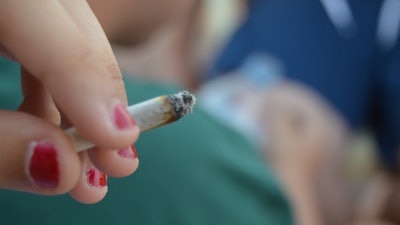
A Columbia University study has found that teens who use cannabis recreationally are two to four times as likely to develop psychiatric disorders, such as depression and suicidality, than teens who don’t use cannabis at all.
The research, published in JAMA Network Open May 3, also finds that casual cannabis use puts teens at risk for problem behaviors, including poor academic performance, truancy, and trouble with the law, which can have long-term negative consequences that may keep youth from developing their full potential in adulthood.
“Perceptions exist among youth, parents, and educators that casual cannabis use is benign,” said Ryan Sultan, MD, assistant professor of clinical psychiatry in the Department of Psychiatry at Columbia and lead study author. “We were surprised to see that cannabis use had such strong associations to adverse mental health and life outcomes for teens who did not meet the criteria for having a substance use condition.
The study, he said, is the first to identify that subclinical, or nondisordered, cannabis use—symptoms and behaviors that do meet the criteria for a clinical disorder—has clear adverse and impairing associations for adolescents.
To conduct their research, Dr. Sultan and colleagues analyzed responses from a representative sample of respondents to the National Survey on Drug Use and Health, an annual survey to collect data on tobacco, alcohol, illicit drugs, and mental health. The cross-sectional study included approximately 70, 000 adolescents between the ages of 12-17.
The researchers found that more that 2.5 million U.S. teens—or about 1 in 10–were casual cannabis users. More than 600,000 teens—roughly 1 in 40—met the criteria for cannabis addiction. To be considered addicted, an individual must meet at least two of 11 criteria, which include an inability to reduce consumption, constant cravings, and relationship and social problems.
Additionally, nondisordered cannabis users were 2-2.5 times more likely to have adverse mental health outcomes and behavioral problems, compared to teens who didn’t use cannabis. Teens with an addiction to cannabis were 3.5 to 4.5 times more likely to have these issues.
Numerous studies note that cannabis use can alter the development of the cerebral cortex, the brain’s center of reasoning and executive function, posing a risk to young people whose brains have not matured. Marijuana use in adolescence is associated with difficulty thinking, problem-solving, and reduced memory, as well as a risk of long-term addiction.
“Exposing developing brains to dependency forming substances appears to prime the brain for being more susceptible to developing other forms of addiction later in life,” said Frances R Levin, MD, the Kennedy-Leavy Professor of Psychiatry at Columbia and senior study author.
Dr. Levin, who directs Columbia’s Division of Substance Use Disorders, said mental health problems and cannabis use are closely linked. “Having depression or suicidality may drive teens to use cannabis as way to relieve their suffering,” she said. “Concurrently, using cannabis likely worsens depressive and suicidal symptoms.”
The researchers said the findings are particularly concerning given the popularity of cannabis as states have moved to make the drug legal. As of April 2023, 22 states have legalized recreational marijuana. Thirty-eight states allow the use of medical marijuana.
This raises questions if the criteria used for establishing a diagnosis of a substance use disorder need to be re-evaluated for youth, Dr. Sultan said who is also the medical director of Integrative Psych, where he specializes in substance use disorder treatment.
“While teenage cannabis use is illegal, even in states with legalized cannabis, there are little to no true protections for teens, such as educational campaigns,” he added. “Federal legalization offers the opportunity to address those safeguards.”
The researchers are continuing this work by evaluating if adolescents’ casual use of nicotine and alcohol by adolescents also demonstrate adverse and impairing effects on brain function, mental health, and long-term addiction.






















